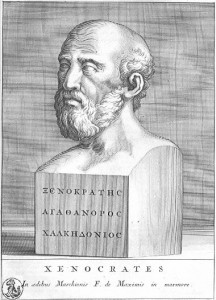In a post two weeks ago, I discussed an amusing if tendentious story about Aristotle and his crew usurping Plato’s turf in the garden of the Academy and suggested that this story helps us to imagine the ways in which partisans of various students of Plato (e.g. Aristotle, Xenocrates, and Speusippus – wait, Speusippus had no partisans and was hopelessly idiosyncratic!) told stories about Plato that were implicated in their partisan positions. In this post, I’m hoping to analyze a bit more – and speculate a bit less – on the special relationship between Plato, Aristotle, and Xenocrates.

Aristotle had many bones to pick. As I hope to develop in new projects, Aristotle was especially bothered by Xenocrates, who was head of the Academy from 339 BCE until past Aristotle’s death in 322 BCE. Prima facie, that would suggest that Xenocrates was Aristotle’s main competitor during the end of his life, when he was very active in codifying his own approach to philosophy. This might not seem to be a controversial statement, but it should be noted that eminent studies of Aristotle do not even mention Xenocrates’ name. This is in part because no critical edition or translation in English has been published, despite the fact that we have over 250 fragments and testimonia, some rather substantial. The most recent edition is Isnardi Parente, in Italian, published when I was still in swaddling clothes. On the other hand, excellent recent work by John Dillon has paved the road for further investigation of Xenocrates’ philosophy, especially how Xenocrates attempted to canonize certain concepts in Plato’s thought.
On some grounds, Xenocrates and Aristotle borrow genuinely and generously from Plato’s ideas. One example is Aristotle’s conceptualization of the Unmoved Mover from Metaphysics L and Xenocrates’ comparable figuration of the One/Nous, as Dillon has discussed (2003: 107). Dillon notes that the only major difference between Aristotle’s and Xenocrates’ prime mover “is that (a) the contents of the Intellect of Xenocrates’ first principle are specified as the Forms (seen as mathematical entities), and that (b) his Monad exercises a more active providential role in the universe than Aristotle’s God, whose activity is entirely self-centred, and who serves only as an object of striving for all the rest of creation.” As I have investigated elsewhere recently, pursuit of claim (a) yields remarkable results about Xenocrates’ systems of metaphysics and logic; but is it true, as claim (b) suggests, that Xenocrates’ physics fails to exhibit the “striving” of derivative objects for the first principle in a way comparable with Aristotle’s concept of the orexis (desire) of sensible objects? Not if Proclus has anything to say about it!
Of the three types of triangular entities, the equilateral, so Xenocrates claimed, devotes itself to all the divine souls insofar as they are controlled by the One. For Equality is Unity. Thus they are also called divine, for the One is the unique property of the divine. But since the one that is in souls is not [the One] by itself, but it participates in the Multiplicity that is in them, Unity becomes Equality in the souls devoted to the divine on all sides and generates in all living beings a triangle equal on all sides. Thereby, they [wise men of old?] also devote the entirety [of the triangle to the divine], both the motions in straight lines and the conjunctions of motions in angles.
The isosceles triangle is consecrated to those souls that come after the divine souls and are daimonic. In these souls, which are intermediary, are both Equality and Inequality, Unification and Diversity of powers, since their bases are unequal to the lines above them. Consequently, then, the daimones attach themselves (ephaptontai) to the inferior entities at their [lower] extremities, as well as to the superior entities at their higher extremities; and attachment assimilates them (he epaphe exomoiosi) to the [superior entities] in virtue of Equality, whereas it connects them (sunaptei) to the [inferior entitites] in virtue of Inequality.
(Xenocrates F 223 Isnardi-Parente = Procl. In Remp. II p. 48.4ff. Kroll)
In reading this fragment, we have to recall that Xenocrates’ theory of beings assumed that mathematical objects (like triangles) formed the intermediary between us and the First Principles and, moreover, that they were constitutive of the cosmos. What becomes clear from Proclus’ testimony – if we are to take it as closely resembling Xenocrates’ own language and concepts – is that the daimonic triangles actively “attach themselves” to the superior (i.e. equilateral) triangles, and that this “attachment” is a type of “assimilation” to them. It is by virtue of their aspect of Equality that they do so; on the other hand, it is by virtue of their aspect of Inequality that they “attach themselves” to the lower (i.e. scalene) triangles. This is something of a modification of the motions of the “Same” and the “Different” in Plato’s Timaeus (36c ff.), and the principle that soul is a mixture of the Same and Different, as well as Being.
Without going into too much detail (which would involve Theophrastus’ criticisms of Aristotle’s and Xenocrates’ theories of the prime mover, which he understands as disputable on similar grounds), I would just like to point out that Xenocrates’ understands some sort of autonomous activity on the part of the intermediary triangles (yes, we’re talking about autonomous cosmic triangular entities here). It is therefore not obvious that Xenocrates’ inferior entities do not possess something like the orexis (desire) described by Aristotle, although the terminology is quite different, even if the conceptualization might not be. Is this a case, then, of a narcissism of minor differences between Aristotle and Xenocrates?
